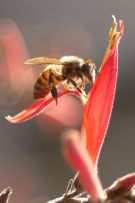
June 30, 2014 (Washington D.C.)--Honey bees are vital for our food supply, since a quarter of all foods that Americans eat depend on pollination by bees. But bee populations fell by 23% over the winter.
So now the White House has set up a task force to try and reverse this alarming trend.
President Obama has directed the Environmental Protection Agency and the U.S. Department of Agriculture to lead a task force to develop a strategy within six months to combat the decline in bees and other pollinators.
He also announced $8 billion in funding for farmers and ranchers in the Midwest to establish new honey bee habitats. Honey bees add over $15 billion a year in value to America’s agricultural crops, so failure to invest in saving the bees that pollinate these crops could be even costlier in the long run. Overall, pollinators contribute $24 billion to the U.S. economy, the White House reports.
Te number of managed honey bee colonies in the United States has declined steadily over the past 60 years, from 6 million colonies or beehives in 1947 to just 2.5 million today.
Some crops are almost exclusively pollinated by honey bees. California’s almond industry alone requires the pollination services of approximately 1.4 million beehives annually—60% of all U.S. beehives—yielding 80% of the worldwide almond production worth $4.8 billion dollars each year. California’s almond industry is at severe risk because of the dramatic decline in honey bees.
The President’s budget also includes $50 million for research into pollinator declines across multiple federal agencies, partnering with state and local governments, tribes and businesses to protect honey bees and other pollinators.
There are several theories for why populations of bees as well as Monarch butterflies and other pollinators have seen sharp population declines, including a condition called colony collapse disorder in which bee hives suffer a sudden and catastrophic loss of bees.
These include exposure to pesticides, loss of genetic diversity, diseases, loss of habitat and food sources.
Some environmental organizations say the President’s actions don’t go far enough. Friends of the Earth told Reuters news service that the administration should ban the use of neonicotinoids, a class of pesticides that has been linked to bee deaths.
The federal government will also work to restore the Monarch butterfly migration using research and habitat improvements that will benefit Monarchs as well as other native pollinators and honey bees. These actions support the February 2014 Joint Statement by President Obama, Prime Minister Harper of Canada, and President Peña Nieto of Mexico to renew and expand collaboration between North American nations to conserve the Monarch butterfly.











Recent comments